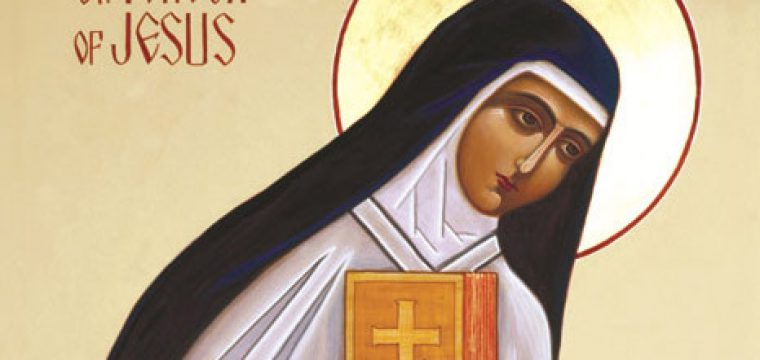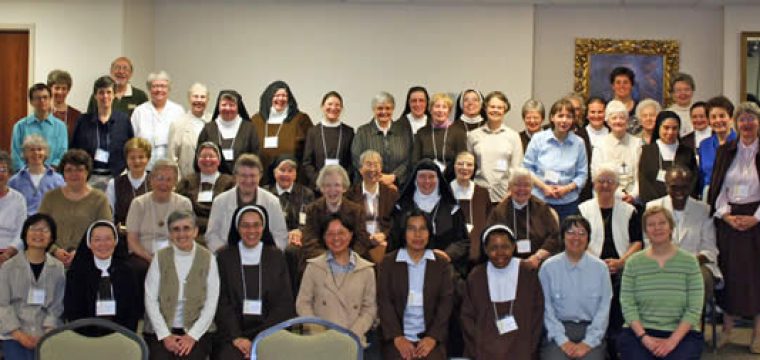
A contemporary statement of the Teresian Charism by the Carmelite Communities Associated
[accordion][acc title=”A Brief History of the Charter of Life”]
The history of Carmelite Communities Associated’s Charter of Life began as early as 1971 in Richfield, Ohio where the association had its first meeting after organizing in 1970. This meeting centered on the Teresian Charism. Each community was asked to dwell on a particular aspect of he charism and to present its reflections to the assembly. Thus, the seed for an articulation of our experience was sown.
The following year at the second meeting in Richfield, as the association’s goals and objectives were being formulated, the need for an inspirational document that would express our lived experience became apparent. The seed took root and through the next three years it slowly grew.
Then, in 1975 at the meeting at Holyoke, Massachusetts, the sisters focused on the history and tradition of our Carmelite Order. By the end of the meeting the desire for a charter had emanated from the group. Subsequently, this project was entrusted to the Chairperson and the Coordinating Committee. The time had come and the seed had blossomed. By August of that same year, the Charter of Life Task Force was established and the work begun. Throughout the years, different sisters generously served as members of this task force
The communities showed their commitment by their excellent responses to various letters and requests from the task force. When in 1976, theWorkbook, a tool for intra-community dialogue and study, was sent out, the response was phenomenal. Each community sent in material, and everyone gave of herself in an effort to articulate our experience of Carmel today. A communal expression evolved through prayer, study, dialogue and growth. The deeper mutual understanding which resulted from fine involvement of the communities was one of the finest fruits of this endeavor. Thus, the Charter manifests our unity, trust, and love.
We realize that we can never completely express the essence of our Carmelite contemplative life, however, in the Charter we have attempted to symbolize it in a poetic fashion. Since the meaning of poetry surpasses the words, our Charter of Life challenges us to go beyond the written word, beyond our present lives, and to move into the future seeking His Face in an ever continual search.
Chairperson of CCA
August 24, 1979
Feast of St. Bartholomew
[/acc]
[acc title=”We are Christians”] We have been baptized into Christ, sealed by his Spirit, and joined to his body the Church where we share the heritage of children who dare to say: Our Father.[/acc]
[acc title=”We are Carmelites”]
We believe that each of us is called by Christ to follow him in a life of apostolic love by searching the depths of divine intimacy in solitary prayer. To guide us we have taken the Rule of Carmel as it has come down to us from St. Teresa. For from within the ancient Carmelite tradition imaged in the figures of Elijah and the Virgin Mary, Teresa, daughter and doctor of the Church, evolved a distinctive style of contemplative life and a spirit of prayer infused with her own remarkable sense of the Risen Christ and the Church. We in our time have recognized in the Teresian Carmel the substance of our own desires. In Christ’s name, therefore, we have gathered to live a life of prayer in the light of Carmel’s Rule quickened by Teresa’s spirit. We set forth here our way of life for ourselves and for all who would know us better.
The Spirit within presses us to pray always and our Rule counsels us to continual meditation in silence and solitude. Thus we ordinarily seek to be alone and to preserve about us an atmosphere of gentle silence so as to give ourselves to an ever deepening communion with the Lord. Our solitude is a desert of time and space for uncluttered attention to him; our silence, a climate of peace for listening. One penetrates the other and together they make up the environment of prayer. Yet neither is stranger to struggle and dread. Rather they engender a fertile starkness of inner freedom and presence, awesome with the overshadowing of the divine and alive with the experience of all that is human. It is this aloneness we seek for ourselves and accord to one another with simplicity and appreciation.
Each Sister has her own room apart. Our room is for us a place both sacred and familiar, a desert where we are at home. We reserve two hours each day for solitary prayer, but the same spirit of prayer overflows into the hours of reading, study and work, gracing each as we take it up with a quality of unhurried attention and esteem. This spirit of prayer and leisure, nurtured in solitude but all-pervasive, gives to the successive moments of our life a contemplative dimension and draws
Within the contemplative wholeness of our life, there are certain times when we exchange the presence of solitude for the presence of community. The Rule we follow indicates these
We are a community of faith and when we meet for worship, it is to break the Bread of God’s Word and the Bread of his Life. Our celebration of the Eucharist is the source and summit of Christ’s life in us and of our shared life in him. For when we eat the bread and drink the cup of this Paschal Sacrifice, we are created and renewed as disciples who live the dying and rising of the Lord and who by their love for one another proclaim the presence of the Kindom. Daily in the Eucharist Christ calls forth from us the deepest personal response, only to transform this gift of ourselves into a communion of life.
The liturgy of the hours creates a setting for the Eucharist and continues Church’s ceaseless worship. For with her, in union of heart andd mind, we extend the memorial of the Paschal Mystery to the hours and seasons of the liturgical year savoring the psalms and scriptures in greater fulness. With God’s Word in our hearts and this praise on our lips, we pray together the liturgical hours, gathering the prayer of God’s people into our own. Thus quietly and imperceptibly, the Word of God effective in our midst continues the Eucharistic work of creative and redeeming love. How we do not know, except that the ground itself brings forth fruit.
Again, we meet regularly as a community to discuss our affairs and to explore the meaning and direction of our life together. In this sacred time we break the bread of the Spirit for one another, for we believe that the Spirit abides in each of us and quickens us as a community. Thus we rely on one another for the openness of heart and mind so necessary to fruitful dialog and for a willingness to share the responsibility of creating a quality of human arid religious life befitting us as children of God.
Finally, we come together for the common meal and for a time of informal recreation. There is a sacredness about this time, too, for we reserve it to be together believing that our communion of life is strengthened when we. break the bread of joy arid peace for one another.
Thus we are solitaries and we are community, without confusion or contradiction, for Christ is the unity of our lives and presence to him the fulfillment of our desires Indeed as the love of Christ lures us into the wilderness, so the love of Christ gathers us together. The vacation to solitary prayer itself inclines us toward community as toward the visible presence of its call to communion. There, too. do we find the strength of a tradition which roots us in the Church and in support of a common life which frees us for prayer.
Yet we know that solitude, the secret chamber of a loving heart forgetful of self and wholly taken up with the Lord, is an ideal. Our life is a moving towards it under the action of God’s Spirit, working through our own efforts in part and in part through the refining process of life. Likewise, the Gospel ideal of community stretches before us, for our communion of life, wrought in the Eucharist, shares in the “already” and the “not yet” of the Church’s own life, and like her we are continually called to attain the full stature of the risen Christ. Daily we grow towards this ideal, as we take on the likeness of the Lord Jesus who laid down his life for his friends, and are built up by the Spirit into a living temple of the Lord, a sacrament of God’s redeeming love in the world. These two lofty and compelling ideals mark our way as Carmelites, a way which is the Paschal journey of our Christian life. Between fidelity to solitary prayer and commitment to creating a community of love, our days move in a rhythm of creative tension, not without its stress and demands, but sweetened always by a joyful gratitude for the abundance of life and the beauty of the calling which is the portion of our heritage.
We are people who share the history and tradition of a long established, world-wide religious family. Our story begins some 800 years ago with an original group of Christian solitaries on Mt. Carmel. But the origins of our tradition recede into the penumbra of meaning enveloping the figures of Elijah, the prophet, zealous proclaimer and champion of the Divine Word, arid Mary, Mother of the Lord, its perfect beholder and disciple. Down through the ages, men and women, stirred by the ideal they image, have found their fulfillment in Carmel. Even today these men and women continue to enrich us with the inspiration of their lives and the wisdom of their experience. Teresa of Jesus and John of the Cross stand out among them, for they have passed on to us a rich doctrine of mystical prayer which continues to shape our understanding of the Rule. Indeed, Teresa and John are the principal exponents of the Carmelite tradition of prayer, not only for us, but for all those men and women throughout the world whom we call our brothers and sisters in Carmel.
We, in our turn, are impelled to hand on this tradition in a living way. And thus as we receive new members into our communities, we all share the responsibility of incorporating each one into the life and tradition we ourselves have received and cherish.
The quiet presence of Mary has accompanied Carmel in its long pilgrimage and goes with us today. We know her as mother, sister and friend, she who is the virginal abode of God’s Word. In secret she ponders the Word and in bringing forth Christ she becomes Mother of the Church. From age to age she gives herself over to an untiring solicitude for God s people as all generations call her blessed. Thus do we honor her as the grace-filled woman of faith and look to her as the image of all to which we aspire.
[/acc]
[acc title=”We are Religious”]
We believe that the Spirit within bids us follow Christ as poor, chaste and obedient. The Church summons us and to her we hold ourselves accountable. It is she who receives the vows, which solemnly symbolize our assent to God’s call and ratify our desire to consecrate ourselves, body and Spirit, to the Lord and to the service of his Church.
In choosing celibacy, we commit ourselves to a way of loving which binds us to Jesus Christ and in him to his people, in all-inclusive, redeeming love, Jesus, whom we take as Beloved, Friend and Companion for the Way, himself teaches us this love. We celebrate it in the Eucharist and give it flesh and blood, day to day, in the mutual self-giving of our community life. Centered in Christ and in community as in a source, celibacy frees us for relatedness to the broader community as sister, neighbor and friend. Like every truly human life, the celibate life is a Paschal journey with its own shadowed valleys and arid places. But in the friendship of Jesus, in the simple shared affection of our small familial communities and in the freedom for friendship within and beyond community, we are gifted with an abundance of human fulfillment and a blessed foretaste of the resurrection.
In choosing poverty, we commit ourselves to a way of living which witnesses to the Gospel amid the spiritual and material bounty of creation and undergirds our life of prayer. The poverty of the desert magnifies the cry of the poor and the silence of love hears their voice. It reaches to the heart of prayer as the familiar echo of its own nakedness of spirit to shape our consciousness and inflame our caring for the plight of all who are needy, weak or small. We are ordinary people committed to a life-style of Gospel simplicity. We work for our living and hold our possessions in common, sharing them in the kindly spirit of concern for personal need counseled by our Rule. Receiving all things as God’s gifts, w desire to share them with gratitude and to consecrate the by use and non-use, in reverence, responsibility and freedom. In all things we keep before us the example of the Lord Jesus for whom poverty was the servant of love, for out of love he empties himself to make us rich.
In choosing obedience, we commit ourselves to a way o fidelity to the Father’s will which depends on a listening heart. The Lord Jesus went this way of obedience to glory and we follow him. We believe that Father has said everything in Jesus Christ and that the Spirit discloses the meaning of the Christ-mystery as it engages each of us personally and all of us as a Community in our day to day living. It is our part to listen for the Spirit speaking in each one of us, in the community, in the Church and in the signs of the times. Therefore, we rely on one another for openness in the processes of communication by which we try to discover God’s will for us an to do it.
With this understanding, the government of our communities is simply structured .We choose a leader from among ourselves and together with her share the responsibility to discernment, for making and supporting decisions, and for at that pertains to the peaceful ordering of our everyday lives.
In professing our vows, we have said “yes’ to the Father’s gracious call to live out our Baptismal grace according to the evangelical counsels. As people of the Church we are built up and sustained by God’s love visible in the lives of Christians all about us; so also do we believe that our life of celibacy, poverty and obedience manifests still another dimension of God’s unfathomable love and graces the Body of Christ with its own unique gifts. Yet not as though we had reached any perfection, but we press on hoping to lay hold of him who laid hold of us and to hasten the day when God will be all in all.
We are people on the way, and therefore we appreciate the support of a disciplined life. Our asceticism, however, is of a piece with our life itself. Its source is the Gospel call to a change of heart, its shape is the shape of Christ’s good Cross, its direction is at the Spirit’s breathing, and its work is to free us to live our vocation in wholeness and joy. Our tradition teaches and our experience confirms the singular value of the daily renewed effort to immerse ourselves in the Word of God through reading, meditation and study. Likewise the asceticism of silence and solitude so fundamental to our life admits of endless refinement in motivation, meaning and practice. There is also that more subtle dimension of asceticism arising from the unchosen austerities inherent in work and community life, in change, growth and aging, and in the fragility of the human condition itself. All these have a prior claim on our attention and energies. But at the same time we value those disciplines both old and new which heal, support and develop us in body, mind and spirit and dispose us more fully for prayer and community living. Our care is to grow strong in the Lord, guided by his Spirit who teaches us the ways of freedom and the measure of truth.
We are children of our time. We acknowledge its history, its culture, its greatness, its sin. What we are by inheritance, we choose in love, for we believe that the God whose face we seek comes to meet us in each unfolding moment of the human story. At the same time, we believe that Carmel’s life of prayer is a vital part of the Christian response to the Gospel imperative that we redeem the times. And so we have fashioned our life of prayer in ways appropriate to itself yet new, in order to become within the local church and community a more visible and accessible presence of the universal love to which we aspire. Whatsoever things are just, noble gracious, and true, these we ponder and hold fast, while our lives proclaim trial the Lord is near.
We walk in faith. Faith is the perennial wellspring of our life for we are centered on One whom we love but do not see, and the principal apostolic fruitfulness of our prayer is the unseen work of grace in the secret places of the human spirit. Moreover, we believe that our life, though ordinary as ourselves, speaks of more than ourselves. For when we are present in the neighborhoods and cities of the human community, we are a prophetic presence of the Church pointing beyond ourselves to the very mystery of God and the fact of God’s love. At the same time, like the prophets of old, we are free to move in those narrow places on the frontiers of society and culture, to live and to speak the truth as we increasingly come to see it. Faith is, of course, the substance of things unseen; we do not possess what we hope for. But we know in whom we have believed and we are certain that he does not disappoint. And so we keep our eyes fixed on Jesus. His love impels us, and zeal for his reign consumes like fire. Yet we go our way with a quiet heart, having a common care for unity and for the peace which binds us together, praying continually in the power of the Holy Spirit, and giving thanks to the Father whatever may come, always and everywhere.
October l5, 1979
Acknowledgement: The CCA acknowledges its gratitude to all those who at any time were members of the Charter Task Force:
Sr Teresa Hahn, Chairperson, 1975 – 1976;
Sr Joan Bourne, Chairperson, 1977 – 1979;
Sr Claudette Blais, Sr Mary Paul Cutri,
Sr Constance Fitzgerald, Sr. Laureen Grady,
Sr Carolyn 0’Hara, Sr. Mary Roman,
Sr Mary Catharine Scanlan, Sr Vilma Seelaus,
Sr Carmen Womack;
to Sr Marie Celeste Fadden for artwork and design,
to the Indianapolis community for typesetting,
to the Reno Community for printing,
to the Cleveland Community for distribution
The illustrations in this book are from prints made from hand carved linoleum blocks.
The type is Helios light II printed on parchtone paper.
The cover stock is Strathmore Artlaid.
[/acc]
[/accordion]














